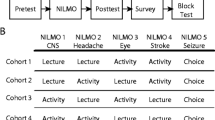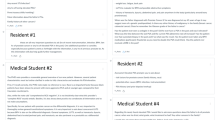Summary
BACKGROUND
Increased clinical demands and decreased available time accentuate the need for efficient learning in postgraduate medical training. Adapting Web-based learning (WBL) to learners’ prior knowledge may improve efficiency.
OBJECTIVE
We hypothesized that time spent learning would be shorter and test scores not adversely affected for residents who used a WBL intervention that adapted to prior knowledge.
DESIGN
Randomized, crossover trial.
SETTING
Academic internal medicine residency program continuity clinic.
PARTICIPANTS
122 internal medicine residents.
INTERVENTIONS
Four WBL modules on ambulatory medicine were developed in standard and adaptive formats. The adaptive format allowed learners who correctly answered case-based questions to skip the corresponding content.
MEASUREMENTS and Main Results
The measurements were knowledge posttest, time spent on modules, and format preference. One hundred twenty-two residents completed at least 1 module, and 111 completed all 4. Knowledge scores were similar between the adaptive format (mean ± standard error of the mean, 76.2 ± 0.9) and standard (77.2 ± 0.9, 95% confidence interval [CI] for difference −3.0 to 1.0, P = .34). However, time spent was lower for the adaptive format (29.3 minutes [CI 26.0 to 33.0] per module) than for the standard (35.6 [31.6 to 40.3]), an 18% decrease in time (CI 9 to 26%, P = .0003). Seventy-two of 96 respondents (75%) preferred the adaptive format.
CONCLUSIONS
Adapting WBL to learners’ prior knowledge can reduce learning time without adversely affecting knowledge scores, suggesting greater learning efficiency. In an era where reduced duty hours and growing clinical demands on trainees and faculty limit the time available for learning, such efficiencies will be increasingly important. For clinical trial registration, see http://www.clinicaltrials.gov NCT00466453 (http://www.clinicaltrials.gov/ct/show/NCT00466453?order=1).


Similar content being viewed by others
References
Goitein L, Shanafelt TD, Wipf JE, Slatore CG, Back AL. The effects of work-hour limitations on resident well-being, patient care, and education in an internal medicine residency program. Arch Intern Med. 2005;165:2601–6.
Ryan J. Unintended consequences: the accreditation council for graduate medical education work-hour rules in practice. Ann Intern Med. 2005;143:82–3.
McKimm J, Jollie C, Cantillon P. ABC of learning and teaching in medicine: Web based learning. BMJ. 2003;326:870–73.
Clark D. Psychological myths in e-learning. Med Teach. 2002;24:598–604.
Bell DS, Fonarow GC, Hays RD, Mangione CM. Self-study from web-based and printed guideline materials: a randomized, controlled trial among resident physicians. Ann Intern Med. 2000;132:938–46.
Spickard A III, Alrajeh N, Cordray D, Gigante J. Learning about screening using an online or live lecture: does it matter? J Gen Intern Med. 2002;17:540–5.
Cook DA, Dupras DM, Thompson WG, Pankratz VS. Web-based learning in residents’ continuity clinics: a randomized, controlled trial. Acad Med. 2005;80:90–7.
Fordis M, King JE, Ballantyne CM, et al. Comparison of the instructional efficacy of Internet-based cme with live interactive CME Workshops: a randomized controlled trial. JAMA. 2005;294:1043–51.
Grundman J, Wigton R, Nickol D. A controlled trial of an interactive, Web-based virtual reality program for teaching physical diagnosis skills to medical students. Acad Med. 2000;75(10 Suppl):S47–9.
Cook DA, Thompson WG, Thomas KG, Thomas M, Pankratz VS. Impact of self-assessment questions and learning styles in Web-based learning: a randomized, controlled, crossover trial. Acad Med. 2006;81:231–8.
Spickard A, Smithers J, Cordray D, Gigante J, Wofford JL. A randomised trial of an online lecture with and without audio. Med Educ. 2004;38:787–90.
Chumley-Jones HS, Dobbie A, Alford CL. Web-based learning: sound educational method or hype? A review of the evaluation literature. Acad Med. 2002;77(10 Suppl):S86–93.
Kemper KJ, Amata-Kynvi A, Sanghavi D, et al. Randomized trial of an Internet curriculum on herbs and other dietary supplements for health care professionals. Acad Med. 2002;77:882–9.
Kerfoot BP, Conlin P, Travison T, McMahon GT. Web-Based education in systems-based practice: a randomized trial. Arch Intern Med. 2007;167:361–6.
Friedman C. The research we should be doing. Acad Med. 1994;69:455–7.
Cook DA. The research we still are not doing: an agenda for the study of computer-based learning. Acad Med. 2005;80:541–8.
AAMC. Effective Use of Educational Technology in Medical Education: Summary Report of the 2006 AAMC Colloquium on Educational Technology. Washington, DC: Association of American Medical Colleges; 2007.
Chen C, Czerwinski M, Macredie RD. Individual differences in virtual environments—introduction and overview. J Am Soc Inf Sci. 2000;51:499–507.
Brusilovsky P. Adaptive educational systems on the World-Wide-Web: a review of available technologies. In: Proceedings of the Fourth International Conference in Intelligent Tutoring Systems, San Antonio, TX, August, 1998.
Brusilovsky P, Pesin L. Adaptive navigation support in educational hypermedia: an evaluation of the ISIS-Tutor. J Comp Inform Tech. 1998;6:27–38.
Specht M, Kobsa A. Interaction of domain expertise and interface design in adaptive educational hypermedia. In: Workshop on Adaptive Systems and User Modeling on the World Wide Web—Eighth International World Wide Web Conference, Toronto, Canada, May, 1999.
Weibelzahl S, Weber G. Adapting to prior knowledge of learners. Paper presented at: Second international conference on Adaptive Hypermedia and Adaptive Web Based Systems, Malaga, Spain, 2002.
Brusilovsky P. Adaptive navigation support in educational hypermedia: the role of student knowledge level and the case for meta-adaptation. Br J Educ Technol. 2003;34:487–97.
Eliot CR, Williams KA, Woolf BP. An intelligent learning environment for advanced cardiac life support. In Proceedings of the AMIA Annual Fall Symposium 1996:7–11.
Casebeer L, Strasser SM, Spettell CM, et al. Designing tailored Web-based instruction to improve practicing physicians’ preventive practices. J Med Int Res. 2003;5(3):20.
Kohlmeier M, McConathy WJ, Cooksey Lindell K, Zeisel SH. Adapting the contents of computer-based instruction based on knowledge tests maintains effectiveness of nutrition education. Am J Clin Nutr. 2003;77(4 Suppl):1025–7.
Romero C, Ventura S, Gibaja EL, Hervas C, Romero F. Web-based adaptive training simulator system for cardiac life support. Artif Intell Med. 2006;38(1):67–78.
Woo CW, Evens MW, Freedman R, et al. An intelligent tutoring system that generates a natural language dialogue using dynamic multi-level planning. Artif Intell Med. 2006;38(1):25–46.
Kabanza F, Bisson G, Charneau A, Jang T-S. Implementing tutoring strategies into a patient simulator for clinical reasoning learning. Artif Intell Med. 2006;38(1):79–96.
Cook DA, Beckman TJ, Thomas KG, Thompson WG. Introducing resident physicians to complexity in ambulatory medicine. Med Educ. (In press).
Fraenkel J, Wallen NE. How to Design and Evaluate Research in Education. New York, NY: McGraw-Hill; 2003.
Case SM, Swanson DB. Constructing Written Test Questions for the Basic and Clinical Sciences. 3Philadelphia, PA: National Board of Medical Examiners; 2001.
Allison JJ, Kiefe CI, Wall T, et al. Multicomponent Internet continuing medical education to promote chlamydia screening. Am J Prev Med. 2005;28:285–90.
Day RS. Challenges of biological realism and validation in simulation-based medical education. Artif Intell Med. 2006;38(1):47–66.
Suebnukarn S, Haddawy P. Modeling individual and collaborative problem-solving in medical problem-based learning. User Model User-Adapt Interact. 2006;16:211–48.
Clark RE. Confounding in Educational Computing Research. J Educ Comput Res. 1985;1:137–48.
MacKenzie JD, Greenes RA. The World Wide Web: redefining medical education. JAMA. 1997;278:1785–6.
De Bra P. Pros and cons of adaptive hypermedia in Web-based education. Cyberpsychol Behav. 2000;3:71–7.
Park OC, Lee J. Adaptive instructional systems. In: Jonassen DH, ed. Handbook of Research on Educational Communications and Technology. 2Mahwah, NJ: Lawrence Erlbaum; 2004:651–84.
Crowley, Gryzbicki D. Intelligent medical training systems. Artif Intell Med. 2006;38(1):1–4.
ACKNOWLEDGMENTS
We thank V. Shane Pankratz, Ph.D., for assistance with statistical analyses, and K. Sorensen for assistance in developing the modules. An abstract based on this work was presented at the 2007 meeting of the Association for Medical Education in Europe in Trondheim, Norway. The funding source was the Mayo Education Innovation Program.
Conflicts of Interest Statement
None disclosed.
Author information
Authors and Affiliations
Corresponding author
Rights and permissions
About this article
Cite this article
Cook, D.A., Beckman, T.J., Thomas, K.G. et al. Adapting Web-based Instruction to Residents’ Knowledge Improves Learning Efficiency. J GEN INTERN MED 23, 985–990 (2008). https://doi.org/10.1007/s11606-008-0541-0
Published:
Issue Date:
DOI: https://doi.org/10.1007/s11606-008-0541-0




